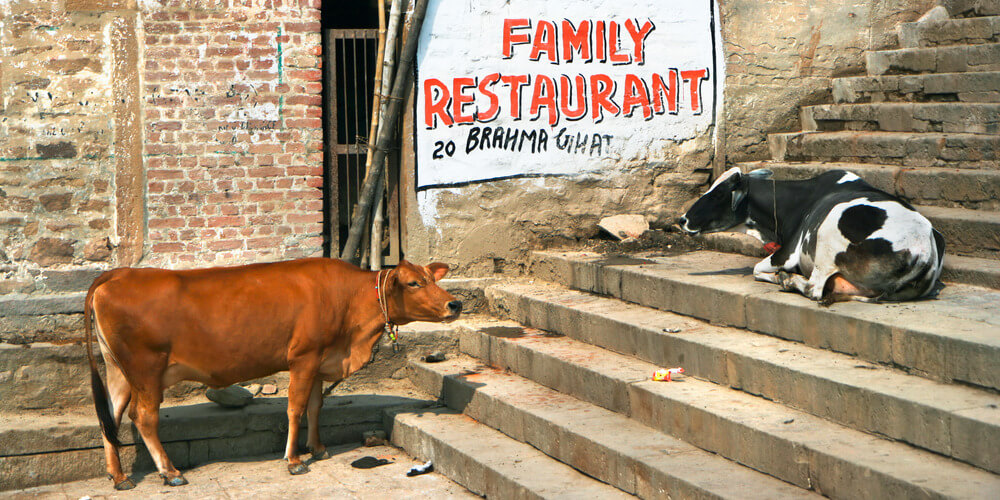Radical Hindus have been campaigning against the use of halal products including meat despite it being an essential part of the Muslim faith.
Mumbai: Objections that halal and jhatka meat is inhumane as it involves a significant amount of suffering for the animal have pitted radical Hindus against religious beliefs.
A petition filed in the Bombay High Court this year demands the country’s meat products be mandatorily labelled “humane” and “non-humane”, arguing the ritual slaughter methods for halal and jhatka meat falls into the latter category. The instigators claim the labels will enable consumers to make conscientious and informed decisions regarding the type of meat they want to consume.
The petition, filed by 23-year-old advocate Virat Agarwal and due to be heard on March 21, 2022 by a division bench comprising Chief Justice Dipankar Dutta and Justice M.S. Karnik, states consumers should be informed about an animal’s mode of slaughter to make an informed choice.
Mumbai-based Agarwal said the Delhi High Court had previously convened a committee to examine the cruel methods of Delhi slaughterhouses with its report implying both halal and jhatka are inhumane methods for butchering animals. The two concepts are animal slaughtering methods for consumption in different communities. While Muslims follow the halal method, Sikhs prefer jhatka. Hindus usually consume both halal and jhatka meat.
In Hindi jhatka means quick. In this method, the animal’s head is swiftly chopped off in one single blow and the animal dies instantaneously. In halal, the animal is killed slowly with the complete draining out of its blood. Halal food refers to food prepared adhering to Islamic law. Halal meat involves slaughtering the animal via a cut to the jugular vein, carotid artery and windpipe.
Most Indian establishments offer both halal and jhatka options for dishes containing chicken and lamb.
Halal meat is an essential part of the Muslim faith and supporters claim the practices of traditional Islamic slaughter are humane. However, particularly Hindu communities in India argue that religious slaughter causes needless suffering and should be prohibited with radical Hindu outfits campaigning against halal food in the country.
Last November, K Surendran, a Bharatiya Janata Party (BJP) leader in the southern state of Kerala, said halal eateries in the state catered to radical Islamists who were increasingly imposing “a halal culture”.
However, other commentators have said it was wrong to prejudice halal eateries as people from different religious backgrounds frequent such joints and those of other faiths work in them. India is currently ruled by Hindu nationalist BJP under Prime Minister Narendra Modi.
The halal food controversy became a fully fledged social media campaign with misinformation stating Muslims spit on food to make it halal. Some videos emerged showing Muslim cooks spitting into vessels containing cooked food in the name of making it halal.
These unverified claims triggered a social media storm and major controversy in Kerala and elsewhere in India. Muslim clerics denied the allegations. They said the halal procedure did not require spitting on the food and that Muslims had not admitted in any court that halal required spitting in food.
“The animals should be killed using modern and humane methods as both halal and jhatka are unnecessarily cruel and painful to the animals, but are permitted under Section 28 of the Prevention of Cruelty to Animals Act, as they are for religious purposes. Consumers have the right to reject the meat obtained by killing animals using crude methods and meat shops, restaurants, flights and railways should prominently mention the method of slaughter through labelling on food items containing meat,” Agrawal said.
He argued consumers who are not religiously obliged to consume halal or jhatka meat, should have the choice of consuming humanely slaughtered meat. Article 21 of the Indian Constitution gave everyone the choice to select their diet, but he contended currently no information was available so it was impossible to make informed choices.
“I contacted the Food Safety and Standards Authority of India (FSSAI) and other authorities asking them to make such information available with labelling on meat food products, but had received no response,” said Agrawal.
Read - European rules on butchering tighten, challenging halal sector
© SalaamGateway.com 2022. All Rights Reserved


Shuriah Niazi